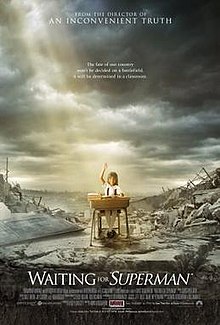Waiting for "Superman"
| Waiting for "Superman" | |
|---|---|

Theatrical release poster
|
|
| Directed by | Davis Guggenheim |
| Produced by | Lesley Chilcott |
| Written by | Davis Guggenheim Billy Kimball |
| Starring | Geoffrey Canada |
| Music by | Christophe Beck |
| Cinematography | Bob Richman Erich Roland |
| Edited by |
Jay Cassidy Greg Finton Kim Roberts |
|
Production
company |
|
| Distributed by | Paramount Vantage |
|
Release date
|
|
|
Running time
|
102 min |
| Country | United States |
| Language | English |
| Box office | $6,426,457 |
Waiting for "Superman" is a 2010 documentary film from director Davis Guggenheim and producer Lesley Chilcott. The film criticizes the American public education system by following several students as they strive to be accepted into a charter school.
The film received the Audience Award for best documentary at the 2010 Sundance Film Festival. The film also received the Best Documentary Feature at the Critics' Choice Movie Awards.
Geoffrey Canada describes his journey as an educator and his surprise when he realizes upon entering adulthood that Superman is a fictional character and that no one is powerful enough to save us all.
Throughout the documentary, different aspects of the American public education system are examined. Things such as the ease in which a public school teacher achieves tenure, the inability to fire a teacher who is tenured, and how the system attempts to reprimand poorly performing teachers are shown to affect the educational environment. Teaching standards are called into question as there is often conflicting bureaucracy between teaching expectations at the school, state, or federal level.
The film also examines teacher's unions. Michelle Rhee, the former chancellor of the Washington, D.C. public schools (the district with some of the worst-performing students at the time), is shown attempting to take on the union agreements that teachers are bound to, but suffers a backlash from the unions and the teachers themselves.
Statistical comparisons are made between the different types of primary or secondary educational institutions available: state school, private school, and charter school. There are also comparisons made between schools in affluent neighborhoods versus schools in poorer ones. Since charter schools do not operate with the same restrictions as public institutions, they are depicted as having a more experimental approach to educating students.
...
Wikipedia
